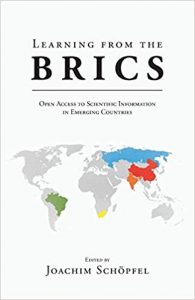Learning from the BRICS
Open Access to Scientific Information in Emerging Countries
Editor: Joachim Schöpfel
Price: $50
Published: May 2015
ISBN: 978-1-936117-84-0
220 pages
The market for scientific and technical information (STI) has been dominated by publishers from the United States, Great Britain, Germany, and the Netherlands. This book takes a look at the interesting developments in publishing coming from the countries with emerging economies known as BRICS (Brazil, Russia, India, China, and South Africa), which comprise 40% of the world’s population and whose GDPs comprise 18% percent of the world’s economy. Each of these countries has a unique economic system as well as differing systems of academic higher education and research. As a result, they have each developed different models of academic publishing for the dissemination of their research results, many of which are based on principles of open access.
This book closes a gap in the literature of academic publishing by examining the strategies employed in STI publishing in these countries. As a growing part of the international STI market, they will impact the ways in which information is produced and made available in the future. The models examined here can serve as alternative options for information delivery in developed countries, and may serve as more sustainable models for emerging economies in Africa and Latin America.
Brazil, Russia, India, China and South Africa all developed their own way to open access, based on specific blends of green and gold road, public investment and private initiatives. What they have in common, is their commitment to research as a driver of economic and societal development and to open science as a way to enhance quality, impact and access to scientific information. Open access is not an end in itself but a means to better science.
Twelve established information professionals and scientists from seven countries contribute to this book and help the reader to understand the open access situation in the emerging countries. How are they doing what they are doing, and why? Where are the bottlenecks, and what are the challenges? What can be learned? Each chapter is introduced by “Facts & Figures,” a section with basic data about each country, on its economic performance, research and development, scientific output and open access publishing.
Brazil: The first chapter presents the open access journal platform ScieELO, the most important open access server for scientific journals worldwide, with an impact well beyond Brazil.
Russia: Chapter two provides a general overview on institutional initiatives for free dissemination of public research on the Internet, especially in the field of grey literature, in a society with strong traditions of public interest prevailing on private intellectual property.
India: Along with a detailed description of the open access movement in India, the third chapter informs about awareness and acceptance of institutional repositories and open access journals among the Indian scientific communities.
China: The author presents the results of a recent survey on the development of open access journals in China. This is interesting insofar as only very few titles are known and indexed outside of China.
South Africa: The last chapter shows how open access can increase its impact and also protect local content, and how it can build on African cultural traditions and values of Ubuntu, i.e. relatedness, sharing and generosity.
Each chapter tells a story, and each story is different. A virtual roundtable concludes the book, with a focus on shared values and engagement in the international community of open access and open science. This book provides an important overview of publishing trends in BRICS nations and will be of interest to anyone concerned with the future of academic publishing, including librarians, higher education researchers, and publishers. It also provides insights regarding copyright issues, the economics of publishing and STI, and international affairs.
Joachim Schöpfel is lecturer of Library and Information Sciences at the University of Lille 3 (France), director of the French Digitization Centre for PhD theses (ANRT) and member of the GERiiCO research laboratory. He was manager of the INIST (CNRS) scientific library from 1999 to 2008. He teaches library marketing, auditing, intellectual property and information science. His research interests are scientific information and communication, especially open access and grey literature.
